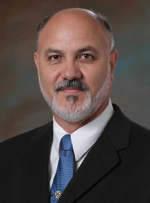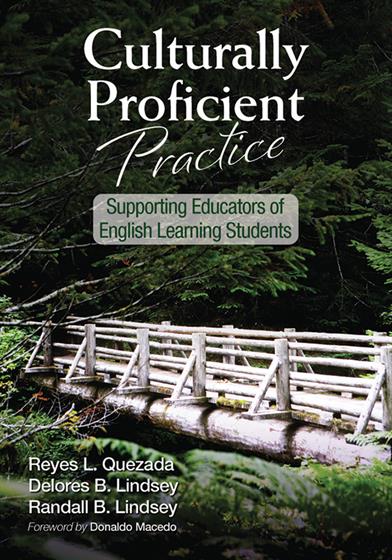Hands-on, Practical Guidance for Educators
From math,
literacy, science, equity, multilingual learners, and SEL, to assessment, school counseling,
and education leadership, our books are research-based and authored by experts
on topics most relevant to what educators are facing today.

Culturally Proficient Practice
Foreword by Donaldo Macedo
With this powerful guide, educators learn how to improve the academic success of English learners by putting culturally proficient practices to work in their classroom and schools.
- Grade Level: PreK-12
- ISBN: 9781452217291
- Published By: Corwin
- Year: 2012
- Page Count: 208
- Publication date: August 30, 2012
Review Copies
Description
Help your English learning students achieve academic success!
U.S. demographics are quickly shifting, and it is more important than ever to reach and teach English learning students. Designed to empower educators to become agents of change in their classrooms, schools, and communities, this guide introduces the principles of Cultural Proficiency and how they can help improve educators' ability to effectively teach English language learners. This book features:
- Activities that build core Cultural Proficiency skills and promote personal transformation
- A chapter-by-chapter rubric for working effectively with English learning students
- A conversation-starting case story featuring the River View School District
- Strategies for using action research to improve the success of English learning students
By focusing on Cultural Proficiency—and the underlying causes of EL achievement gaps—educators can uncover ways to break down academic barriers and use students' cultural background as educational assets.
"This is a valuable resource for staff developers creating culturally proficient learning environments to close the achievement gap. This work focuses on English learning students with the same 'inside out' approach as the authors' previous work. A perfect asset for a professional learning community book study!"
—Linda Fisher, Staff Development Coordinator
Lincoln Unified School District, Stockton, CA
"The book provides the school leader with the tools to engage themselves and others in making English learning students a priority. It is a must read for educators to get those hard and healthy conversations started and to examine our school practices and policies."
—Lori Henderson, Assistant Superintendent of Educational Services
Manitoba, Canada
Key features
- Applies the Cultural Proficiency framework and tools to the challenge of narrowing achievement gaps between ELs and their non-EL counterparts.
- Presents an asset-based approach to working ELs that counters the perspective that students from non-English speaking backgrounds come to school with certain deficits that prevent them from learning
- Provides educators with the knowledge and skills to maximize educational opportunities for all students, independent of students' primary language.
- Includes a running case story of cultural identity exploration and discovery as a guide for the reader to consider themselves within the context of the classrooms, schools and communities they serve.
- Features an English Learner Instruction Rubric that illustrates ineffective-to-effective instructional approaches and ineffective-to-effective supporting coaching and leadership approaches.
- Introduces action research as a model for leaders, coaches and teachers to utilize their own school districts, schools, and classrooms as centers of research on best practices to increase the academic achievement of English language learners.
Author(s)

Reyes L. Quezada
Dr. Reyes L. Quezada was born in San Juan De Los Lagos, Jalisco, Mexico. His family of 8 immigrated to the United States and settled in Southern California in a farm near the Mexican border by Brawley. He was seven years old. His father was a farmworker and participated in the Bracero Program (Guest worker) in the early 1960’s, his mother was a stay home mom who provided a caring and loving environment for his brothers and sisters. He has been a teacher, community college counselor and teacher educator for the past thirty-eight years, twenty of those years as a professor. He joined the University of San Diego, San Diego California in 1999. He has been a professor at the University of Redlands, and California State University Stanislaus. He holds Community College credentials in Counselor Education, Supervision, Psychology, and a California Multiple-Subjects Bilingual Emphasis Teaching credential-Spanish. His degrees include a Bachelor of Arts from San Jose State University and a Minor in Mexican American Studies, and holds four Advanced Degrees-a Masters degree in Education from the University of San Diego, and a Masters degree from San Diego State University, a post Masters degree-Educational Specialist degree from Point Loma Nazarene College and a doctorate from Northern Arizona University, Flagstaff, Arizona.
Dr. Quezada has presented at international, national, and state conferences (France, Spain, South Africa, Mexico, Costa Rica, Middle East, Italy, England, Colombia, Canada, Hong Kong, Thailand, Cambodia, Philippines, Czech Republic, Greece, Ghana, and in Israel). His teaching, research and publications are on issues of cultural proficiency, equity, international education, diversity, family school and community engagement, bilingual education and migrant education. His publications include four books, twenty journal articles and eleven book chapters. He has edited five themed journals on internationalizing colleges and schools of education for the Catholic Education Journal, Teacher Education Quarterly, and in Teaching Education, as well as on Family, School and Community Engagement and Partnerships in the journals Teaching Education and Multicultural Education.
He is on the board of directors for state, national and international organizations including the national Council of Educator Preparation Programs (CAEP), the American Association for Colleges for Teacher Education (AACTE), and the current Chair of the International Council for the Education of Teachers (ICET). He was the Co-chair of the California Commission on Teacher Credentialing-Committee on Accreditation (COA), and was Associate Editor for Teacher Education Quarterly, and sits on many editorial and review boards including the Annual Editions of Multicultural Education, Teacher Education Quarterly, Issues in Teacher Education, the School Community Journal, the Journal of Hispanics in Higher Education, Educational Research Journal, Teacher Education Quarterly, Horizon, the Journal of International Studies, and Issues in Teacher Education. He was on the San Bernardino County-Third District Supervisor Representative to the Equal Opportunity Commission, and former School Board President and current member for Real Journey Academies Charter School in San Bernardino, California.

Delores B. Lindsey
Dr. Delores B. Lindsey retired as Assistant Professor of Educational Leadership at California State University San Marcos; however, she has not retired from the education profession. Her primary focus is developing culturally proficient leaders. She helps educational leaders examine their organizations’ policies and practices, and their individual beliefs and values about cross-cultural communication. Her message to her audiences focuses on viewing, creating, and managing socially just educational practices, culturally proficient leadership practice, and diversity as an asset to be nurtured. Her favorite reflective question is: Are we who we say we are? Delores and husband Randall, her favorite Sage/Corwin author, continue to co-write about the application of the four Tools of Cultural Proficiency. Her most recent publication, which is on the Bestseller list from Corwin, is Leading While Female, A Culturally Proficient Response for Gender Equity, with Trudy Arriaga and Stacie Stanley.

Randall B. Lindsey
Email – randallblindsey@gmail.com
Website - CCPEP.org
Twitter - @RBLindsey41
Table of Contents
Foreword by Donaldo Macedo
Acknowledgments
About the Authors
Introduction
Part I. The Context and Tools for Educating English Learning Students
1. Setting the Context
Getting Centered
Going Deeper
2. The Tools of Cultural Proficiency
Getting Centered
Going Deeper
3. Educators' Rubric for Support of English Learning Students and Their Communities: Changing the Conversation
Getting Centered
Going Deeper
Part II. River View School District: A Context for Educating Linguistically and Culturally Diverse Students
4. Assessing Cultural Knowledge: You, Your School, and Your Community
Getting Centered
Assessing Cultural Knowledge
Using the Rubric: Assessing and Developing Your Cultural Knowledge About Self, School, and Community
River View Case Story
Professional Learning for General Educators Who Teach English Learning Students
Going Deeper
6. Managing the Dynamics of Difference: You, Your School, and Your Community
Getting Centered
Managing the Dynamics of Difference for Me, My School, and My Community
Using the Rubric: Managing the Dynamics of Difference for Self, School, and Community
River View Case Story: The Middle School in Conflict
River View Case Story: The Clash of the Coteachers
Professional Learning Through Inquiry Helps Manage the Dynamics of Differences
Going Deeper
7. Adapting to Diversity: You, Your School, and Your Community
Getting Centered
Adapting to Diversity for Me, My School, and My Community 101 Mindfulness
Using the Rubric: Adapting to the Diversity of Your School and Community
River View Case Story: Confronting Barriers to a Community in Transition
River View Case Story: Parents as Change Partners
Professional Learning for General Educators Who Teach English Learning Students
Going Deeper
8. Institutionalizing Cultural Knowledge: You, Your School, and Your Community
Getting Centered
Institutionalizing Cultural Knowledge for Me, My School, and My Community
Using the Rubric: Institutionalizing Cultural Knowledge About Your School and Community
River View Case Story: Benchmarking Along the Way
Professional Learning for General Educators Who Teach English Learning Students
Going Deeper
Part III. Next Steps
9. Guiding Your Own Research That Leads to Action
Getting Started
Action Research: A Model for Improvement of Practice for You, Your School, and the Community Served by Your School
Educators as Practitioner Researchers in Support of English Learning Students
Action Research Through a Culturally Proficient Practitioner Researcher Lens
Action Research Cycle Rubric for Culturally Proficient Practitioner Researchers
Action Research Getting Started Protocol
Closing Thoughts
Questions for Reflection
Resource A. Professional Learning Activity - Assessing Cultural Knowledge
Resource B. Professional Learning Activity - Valuing Diversity
Resource C. Professional Learning Activity - Managing the Dynamics of Difference
Resource D. Professional Learning Activity - Adapting to Diversity
Resource E. Professional Learning Activity - Institutionalizing Cultural Knowledge
Resource F. Recommended Books on Instructional Strategies
Matrix: How to Use Cultural Proficiency Books
References
Index
Reviews
“An excellent guide for a school district working to improve instruction for English learners by promoting the cultural proficiency of teachers, administrators, and paraprofessionals. The book provides a succinct overview of historical issues related to the education of English learners. In addition, it employs a model that can be used with school staff as educators engage in a process to consider how they are educating these students and how they might improve on their practice. An important and valuable feature of the book is the use of a case study of a school district as it engages in such a self inquiry process.”Irma M. Olmedo, Associate Professor Emerita
College of Education, University of Illinois, Chicago, IL
“The book provides compelling rationale for working to improve instruction for English Learners and offers practical advice to new teachers, administrators and paraprofessionals.”Diana Garrido, In School Resource Teacher
San Diego Unified School District, San Diego, CA
“The book provides the school leader with the tools to engage themselves and others in making English learning students a priority. It is a must read for educators to get those hard and healthy conversations started and to examine our school practices and policies. It is about intentional change for the benefit of all our students.”Lori Henderson, Assistant Superintendent of Educational Services
Manitoba, Canada
"Cultural Proficient Practice: Supportive Educators of English Learning Students provides a valuable resource for staff developers who are on the journey of creating culturally proficient learning environments to close the achievement gap. This work narrows the focus to English learning students with the same 'inside out' approach as the authors' previous work. As the reader reflects with 'mindfulness' you actually feel like you are in a workshop with the authors themselves! A perfect asset for a professional learning community book study!Linda Fisher, Staff Development Coordinator
Lincoln Unified School District, Stockton, CA
"This book offers a unique set of tools for teachers and administrators, encouraging them to work cooperatively in identifying negative 'institutionalized' beliefs that are barriers to creating healthy teaching practices and cultural competency. The authors have creatively included a historical background on English Learner issues, frameworks, rubrics, and vignettes that invite educator participation. The authors offer a comprehensible plan of action for schools, administrators, and teachers to become culturally competent in order to most effectively work with English Learners AND each other."Carmen E. Quintana, Educator and Board member
McGill School of Success, San Diego, CA
“Simply, the imaginary monocultural mainstream simply does not exist anymore. This important book sets the stage for us to teach about, through, and with cultural and linguistic diversity—our own and that of our students and colleagues. It is a valuable and practical resource for teacher education.”Allan Luke, Faculty of Education
Queensland University of Technology, Australia
"With today's diverse classrooms, an understanding of the socio-cultural factors that influence student success is foundational to creating environments that encourage high levels of academic achievment and well-being for all learners. Through a structure of inquiry and reflective application of the tools of cultural proficiency, this engaging book provides practical strategies for building an asset based approach to meeting the academic and social needs of English learning students.Susan MacDonald, Executive Officer of Instruction
Ottawa-Carleton Board of Education, Ottawa, Ontario
"Culturally Proficient Practice: Supporting Educators of English Learning Students is not only a timely book that lovingly challenges educators to understand what it means to be culturally proficient, but it also comprehensively provides a wealth of information regarding the history of English learners’ (mis)education as well as past and current educational and language teaching practices. Without a doubt, this comprehensive text is a much needed addition to the professional development literature on English learner education!"Lilia I. Bartolome, Professor
University of Massachusetts, Boston, MA
"As an English learner myself, I was pleased that the authors clearly articulated through cultural proficiency the importance of valuing the whole student, seeing the student’s language, culture, and community, not as a barrier, but as an asset with which to build academic and social success. It is through understanding of self and others that we begin to see the true potential of our youth."Michael James Isaac, Education Officer III
Department of Education, Mi'kmaw Liason Office, Halifax, Nova Scotia
"Through the unique use of dialogue and critical reflection, school district faculty and staff, as well as university teacher educators, will experience an exhilarating journey through various phases of cultural proficiency development that they need to inform their approach to curriculum, instruction, and assessment. More importantly, the book brings us an awareness that English learning strudents have a cultural capital that we must recognize, honor, and utilize as a powerful instructional resource!"Jose W. Lalas, Professor and Director of Center of Educational Justice
University of Redlands School Board Member, Corona-Norco Unified School District, CA
"I find this book to be a rich and valuable resource for every education professional working in a diverse society. While it exposes the many complex cultural issues that are present in schools, especially in working with English learning students and their families, it proposes a meaningful and practical approach to achieving a viable level of cultural proficiency in education professionals. Bravo!"Anaida Colón-Muñiz, Associate Professor and Former President of the California Association for Bilingual Education
Chapman University College of Educational Studies, CA
"Teachers, administrators and counselors not yet familiar with notions of cultural proficiency should read this book cover to cover. This book is a 'must read' guide for those working with English language learners. With these tools at our disposal there should be no English learner 'left behind'."Lesley A Harbon, Associate Professor
University of Sydney, Australia
Review Copies
Join us for the Visible Learning
Conference in Las Vegas!
Experience groundbreaking research, inspiring speakers,
and transformative networking. Register Now.

